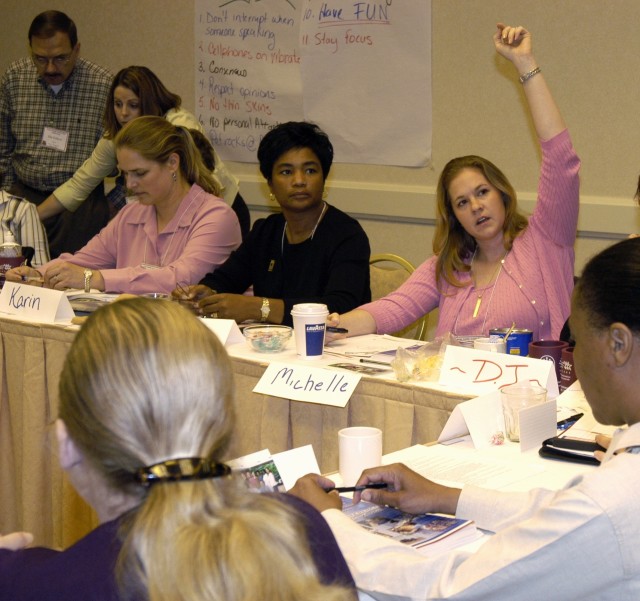
ALEXANDRIA, Va. (Army News Service, Nov. 29, 2006) - Delegates at the 24th Army Family Action Plan conference reviewed 68 issues from Army installations throughout the world Nov. 14-17.
The issues were distributed into eight workgroup categories: wounded warrior, entitlements, family support (of which there were two groups), force-support, medical (of which there were two groups) and outside-of-the-continental-United States.
The top five conference issues of 2006, as voted by the delegates, were:
aEURc Traumatic brain injury rehabilitation program at military medical centers,
aEURc Traumatic servicemember's group life insurance annual supplement,
aEURc Co-Pay for replacement parts of durable medical equipment and prosthetics,
aEURc Convicted sex offender registry outside the continental U.S., and
aEURc Retroactive traumatic servicemembers group life insurance compensation.
The top five critical active issues previously introduced into the AFAP process include:
aEURc Award contracts for household-goods shipments to moving companies based on performance and claims history, as well as cost. Provide full replacement value for lost/damaged household goods;
aEURc Allow Soldiers with at least ten years of service to transfer their Montgomery GI Bill benefits to their dependents;
aEURc Authorize the use of permissive temporary duty for fathers upon birth of a child;
aEURc Eliminate the expiration date for Montgomery GI Bill educational benefits; and
aEURc Allow servicemembers to accumulate 90 days of leave until termination of service.
The four services identified by delegates as this year's most valuable are Army Community Service; Morale, Welfare and Recreation; Army Wounded Warrior Program; and medical care.
Additionally, the delegates voted on the top five mobilization/deployment and family-support strengths. Included on the list were Military OneSource and Army Community Service programs. Morale Welfare and Recreation, family readiness groups and rest and relaxation all tied for third place, and the rapid fielding initiative rounded out the list.
The top three mobilization/deployment and family challenges as determined by the delegates were length and extension of deployments; deployment personnel tempo; and the stop-loss program. The need for more standard National Guard, Active Guard and Reserve, Army Reserve, and active-duty remote family readiness groups, and incomplete family reintegration training for children and teens were tied for fourth place.
A meeting of the General Officer Steering Committee, chaired by the Lt. Gen. James Campbell, was held in conjunction with the AFAP conference. Senior Department of Defense and Army leaders reviewed 24 issues in the AFAP process. Two were completed:
aEURc Dental and Vision Insurance Coverage for Federal Employees: Public Law U.S.108-496 authorizes a stand-alone dental and vision benefit program for federal employees. Employees will pay 100 percent of the premium costs for dental and vision coverage. The Office of Personnel Management has implemented seven supplemental dental plans and three vision benefit plans for federal employees, retirees and their dependents. Open season began Nov. 13 and will run through Dec. 11.
aEURc Basic allowance for housing for activated Reserve component: The fiscal 2006 National Defense Authorization Act authorized full BAH for Reserve-component Soldiers on active duty after 30 days of service regardless of the type of orders or reason used to bring the Soldiers to active duty.
Of the issues that were presented, 22 were listed as active and will be worked until resolution. The GOSC approved the entry of two new issues into the AFAP - Army Career and Alumni Program funding and permanent family readiness support assistants.
AFAP was created in 1983 with the initial AFAP planning conference, and developed fully in 1984 to help the Army address the needs and concerns of family members. The program highlighted the importance of Army families to overall Army success.
The concept of identifying issues to be resolved through worldwide representation of Army family members grew into the AFAP process. It provides a way for policy to become a tangible end-product for Soldiers and their families.
The Family and Morale Welfare and Recreation Command oversees the AFAP process to ensure that issues are referred to the appropriate agencies for resolution. Semi-annual GOSC meetings monitor the progress of each issue until it is resolved or deemed unattainable.
"The issues that we will review this morning, we are going to delve into in great detail because we owe that to you," Campbell said in his opening remarks.
"You have taken a step out of your lives and come from distant stations to be here this week and to make your contributions felt," he continued.
For the past 24 years there have been 618 issues in the AFAP process that have driven 101 legislative changes, 145 Department of Defense Army policy and regulatory changes, and improved programs and services.
"It is very important that those who have never experienced this understand what happens here today," Campbell said, "and see how our United States Army stands up and listen to the concerns of those we serve."
"I have been an advocate for this process for 34 years, and I have watched it evolve," said Lt. Gen. Robert Wilson, Assistant Chief of Staff for Installation Management. "I think it is absolutely essentially to an Army at war; critical to retaining the all-volunteer force and doing what we say we want to do, which is taking care of families and Soldiers.
"This process is about Soldier and family readiness," he said, "and I am really happy with it."
The GOSC will meet again in May 2007 to work on issues identified during this conference, and to continue their efforts to resolve issues identified in previous years.
(Margaret McKenzie works for the U.S. Army Family and Morale, Welfare and Recreation Division.)

Social Sharing